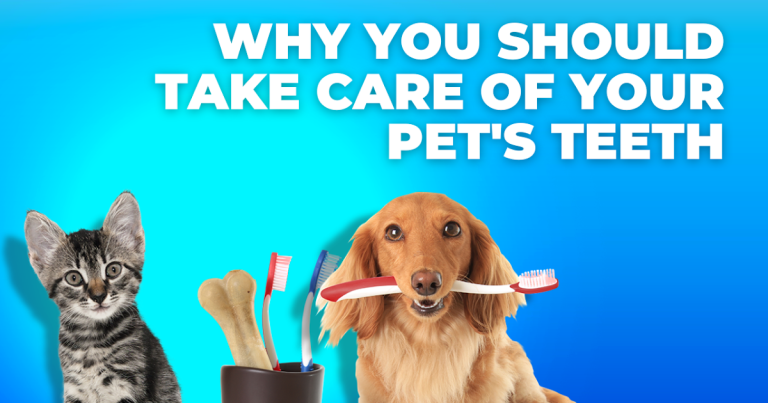INTRODUCTION:
According to one research, dental disease affects over 80% of dogs and cats over the age of three. Toxin absorption into the bloodstream, which causes sickness, is always increased when dental health is compromised. Complete dental care is essential not just for your pet’s oral cleanliness, but also for its general health and well-being. Maintaining proper dental hygiene will help your pet avoid discomfort, tooth loss, and secondary health concerns caused by bacterial infections, such as heart, liver, and kidney disorders.
We’ve compiled a list of some of the most significant reasons why you should take care of your pet’s teeth:
Oral hygiene can aid in the elimination of foul breath.
We all adore our cherished animal buddy, but what about the heavy breathing odor? A mild breath odor is normal, but a strong mouth odor indicates a serious dental ailment. Regular dental cleanings and brushing can expel bacterial development in your pet’s oral cavity and successfully reduce foul breath.
Dental illness can have serious consequences.
Periodontal disease, commonly known as dental disease in humans, is the most serious oral health problem in dogs. It is essentially an infection of the tissues that hold your pet’s teeth, caused by plaque build-up on teeth and gums as a result of improper cleaning and flossing procedures. If not addressed promptly, it can cause bleeding gums, discomfort when eating, and tooth loss.
Regular dental examinations might help you save money.
Our home dogs have inherited the ability to conceal pain and other symptoms of sickness. Anatomically, more than half of your pet’s tooth structure is hidden behind the gum line, making any dental ailment impossible to detect until thoroughly checked. Some pet owners do not want to spend money on preventative procedures when they do not see any illness, not realizing that their pet may have to suffer with pain and other dental illnesses, costing them more money in vet bills if they do not take their pet for dental check-ups on a regular basis, even if everything appears to be fine on the outside.
READ ALSO
Avoid unpleasant circumstances.
Pets experience the same amount of agony as we do when we have a tooth problem. Worryingly, the pets do not understand why they are in pain. As a result, if you can take care of your pet’s dental health, you can keep them from experiencing excruciating discomfort.
Keep serious diseases at bay.
Pets handle their pain and disease expertly. You will not be aware of their dental problem until it has spread throughout his mouth cavity, inflicting further harm and agony. Taking your pet in for frequent dental exams will help you spot any oral illness early on, before it becomes difficult to treat.
There will be no teeth falling out.
Other than chewing food, pets use their teeth for a variety of other tasks on a regular basis, such as carrying or picking up things, playing games, and so on. A small oral condition can evolve to serious periodontal disease, which may result in tooth loss, if your pet does not receive regular dental treatment. The vacant area in the mouth cavity may become a permanent habitat for numerous microorganisms that cause various sorts of oral disorders. This might substantially impair your dog’s food intake as well as other tasks he used to perform using his teeth.
Weight loss might be caused by dental problems.
With ongoing dental disease, your pet’s food intake may be greatly decreased, or he may entirely forsake eating since it is exceedingly uncomfortable for him to chew. This quickly leads to weight loss and, in many cases, a damaged immune system since they are unable to meet their daily nutritional requirements with minimal or no food consumption. A weaker immune system makes your pet more susceptible to various ailments.
Your pet may develop a proclivity for jaw fractures.
Our dogs are more prone to acquire abnormal dental diseases such as abscessed teeth or periodontal disease if they do not receive regular dental treatment. Such ailments eventually weaken and fracture our dogs’ jawbones. Even simple actions like eating gritty kibble or leaping from a table might cause a jaw fracture.
Extractions are avoided with regular dental care.
Severe periodontal disease damages the bones that serve as the supporting framework of the teeth. When bone and gum tissue are gone, the sick tooth cannot be healed, and tooth extraction is the only option. Brushing your pet’s teeth on a daily basis, as well as frequent visits to your pet’s dentist, can prevent a dental infection from progressing to the point where extraction is required.
Poor oral health has an impact on the entire body.
Oral sickness can not just harm your pet’s teeth or oral cavity; it may also harm your pet’s general health. Bacteria and other germs enter the circulation after infecting your pet’s teeth and gum tissues, and spread throughout the body, causing harm to vital organs such as the liver, heart, and kidneys.
Conclusion
Finally, keeping appropriate dental hygiene and taking your pet for an oral examination on a regular basis is the key to preventing significant sickness in your pet. Discuss with your veterinarian and devise a treatment plan to reduce the chance of oral illness and provide your pet with a high quality of life for as long as possible.
























